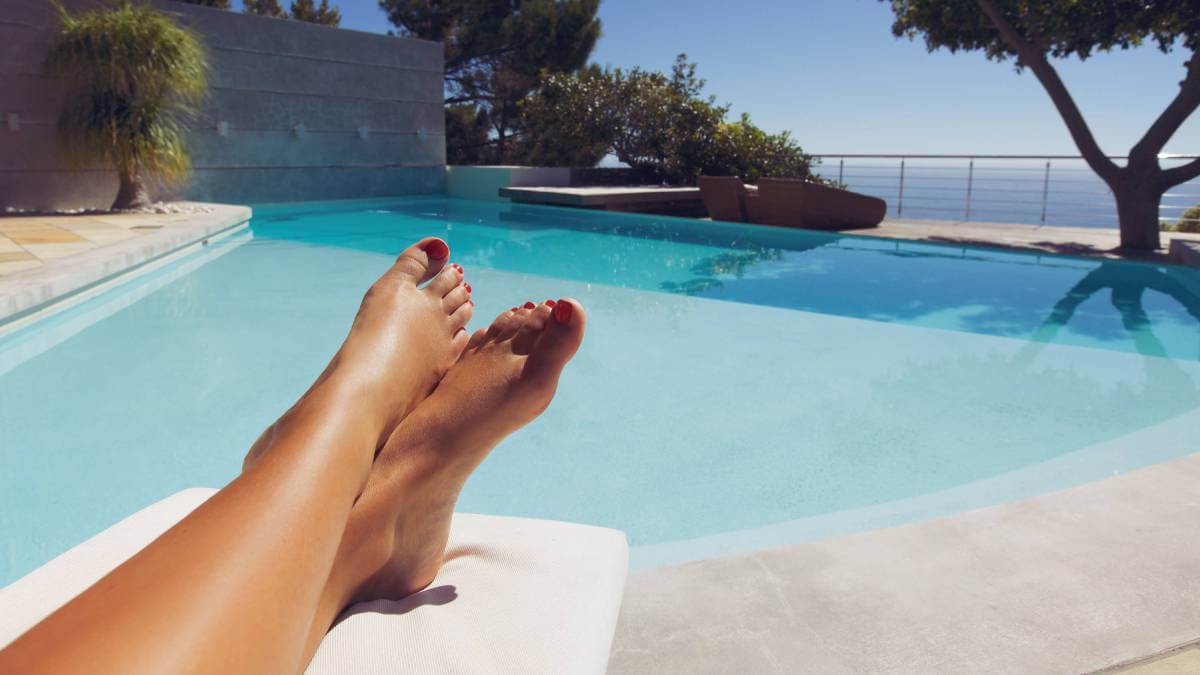Summer is just a few weeks away and it’s predicted to be a hot one.
A sun-kissed glow may look great, but is lounging around on a sunbed ever truly safe?
“As UV rays from the sun reach your skin, they stimulate the production of melanin, a pigment responsible for giving your skin its colour. Melanin acts as a natural defence mechanism, as it absorbs UV radiation and helps protect the skin from damage,” says consultant dermatologist Dr Tim Clayton.
“Increased melanin production leads to tanning of the skin, which is the body’s way of trying to shield itself from further UV exposure.”
So, if we are sunbathing to tan, our skin is always defending itself.
Is it okay to sunbathe for a short amount of time?
The longer you’re exposed to the sun, the worse the impact and damage may be.
“Excessive and unprotected sun exposure, especially with frequent sunburns, increases the likelihood of developing skin cancer, including basal cell carcinoma, squamous cell carcinoma and melanoma,” says Dr Clayton.
Even if a tan develops without any visible signs of sunburn over a shorter period of time, the DNA in your skin cells can still be damaged, notes Dr Clayton. “The DNA damage caused by UV radiation increases the risk of skin cancer, including the most dangerous form, melanoma.”
What about SPF?
“Sunbathing, even with the use of sunscreen, still carries some risks. While sunscreen can provide some level of protection, it is not foolproof, and other factors should be taken into consideration,” he explains.
While sunscreen can help reduce the amount of UV radiation that penetrates the skin, it does not completely block it. “Some UV radiation can still reach the skin, increasing the risk of DNA damage, premature ageing, and skin cancer.”

A lot of the time, the protection we use does not actually work as it should.
“Sunscreens are designed to reduce the amount of UV radiation that reaches the skin, but they are not perfect barriers. Factors such as inadequate application, insufficient SPF and not reapplying sunscreen regularly can compromise its effectiveness. Additionally, some areas of the body, such as the eyes and lips, may not be adequately protected by sunscreen alone,” Dr Clayton says.
Equally, we may expose ourselves to too much sun, because we think it will be safe.
“Wearing sunscreen may give a false sense of security, leading individuals to stay in the sun for longer periods, or neglect other sun-safe practices, such as seeking shade or wearing protective clothing. Sunscreen should be used as part of a comprehensive sun protection strategy, rather than relying on it as the sole means of protection.”
We are not always the best at applying it, either. Sunscreen application requires proper technique and thorough coverage to be effective. Many of us don’t apply enough sunscreen, miss certain areas, or fail to reapply it when needed. “These application errors can reduce the sunscreen’s effectiveness and leave the skin vulnerable to UV damage,” he says.
Is a tan always bad for my skin?
View this post on Instagram
However much you may want to look bronzed, it is not safe.
“While a tan is often seen as a desirable aesthetic for some individuals, it is important to understand that any change in skin colour, due to sun exposure, indicates damage to the skin,” Dr Clayton says.
How can I get a tan instead?
A fake tan may have to be the answer if you want to protect your skin and get a glow.
View this post on Instagram
As Dr Clayton says: “Self-tanning products or spray tans can provide a safer alternative to achieve a tanned appearance without subjecting the skin to harmful UV radiation.”
Do you still enjoy sunbathing? Do you use fake tan? Why not share your experience in the comments section below?
Also read: Why does ageing skin thin and what can be done to improve it?
– With PA
Disclaimer: This article contains general information about health issues and is not advice. For health advice, consult your medical practitioner.


With all of this appropriate caution, don’t forget that exposure to the sun is almost an essential to good health. Don’t forget that the exposure to UV and the production of melanin also stimulate the production of Vitamin D. The vitamin D produced in this manner is naturally integrated into the bodies’ metabolism and is an essential ingredient in the defence mechanism of the body against viral infections.
Vitamin D in our foods is good, but for absorption it must be accompanied by fats and oils in that food. If you have cut back to a low to zero fat diet, your body may have trouble absorbing the vitamin D from your foods.
How much is an ideal amount of sun exposure to ensure a healthy level of vitamin D? I haven’t been able to find agreement on this as there are many variables such s time of day, line of Latitude, local particle air pollution and even altitude. It seems though that a few minutes in the morning on as much body as possible may not have any adverse effects on your skin.. (For overall health, plus that any viral particles on our skin can be denatured and rendered harmless by only a few minutes exposure to the UV in sunlight.)